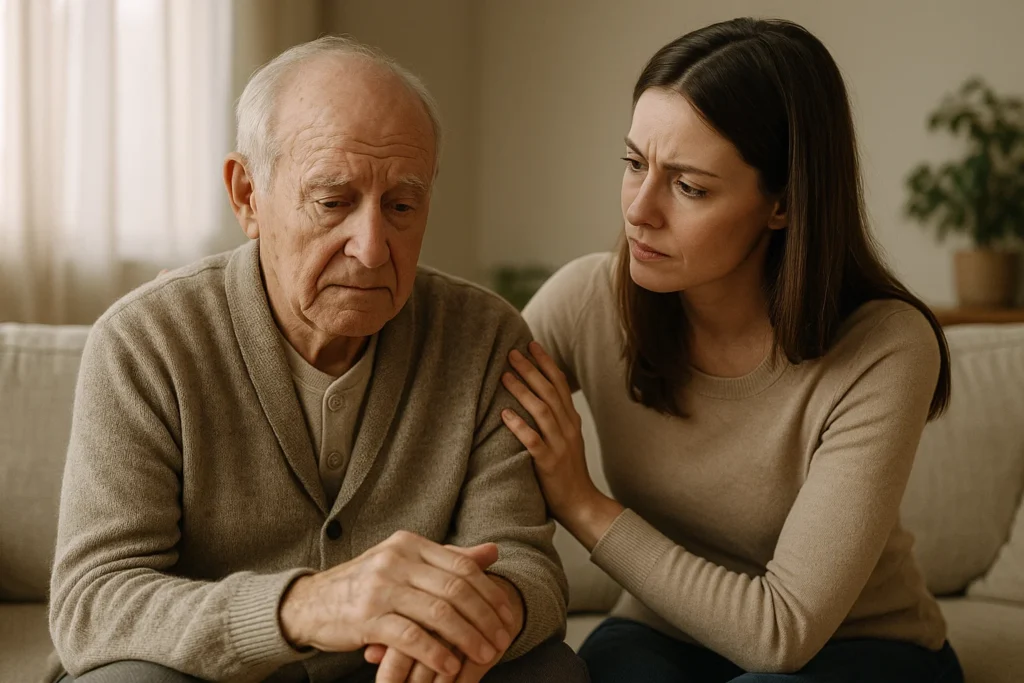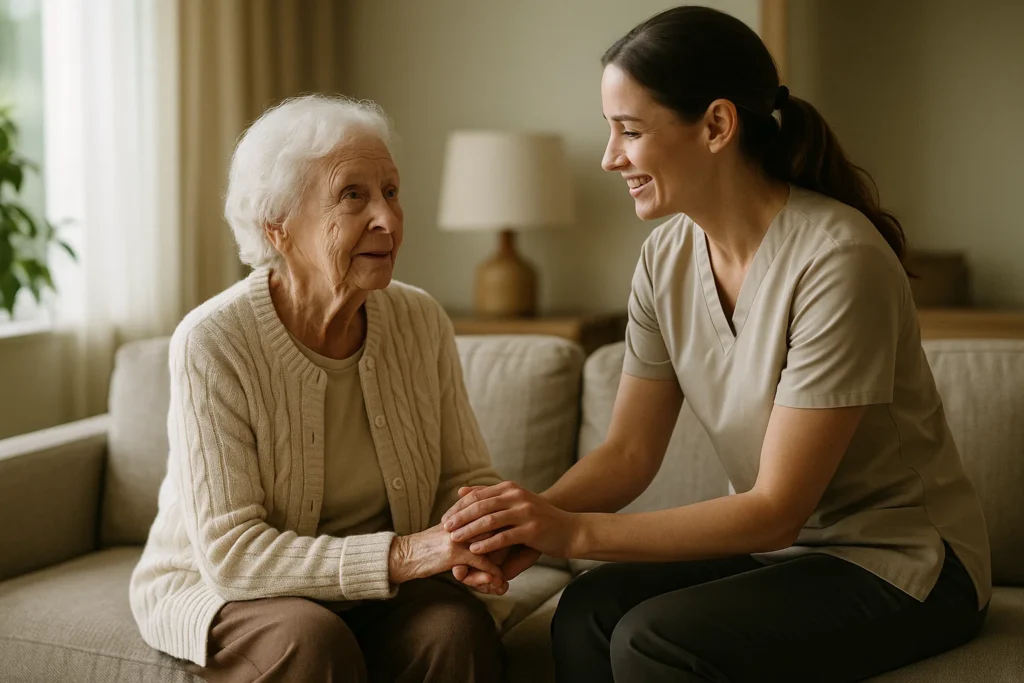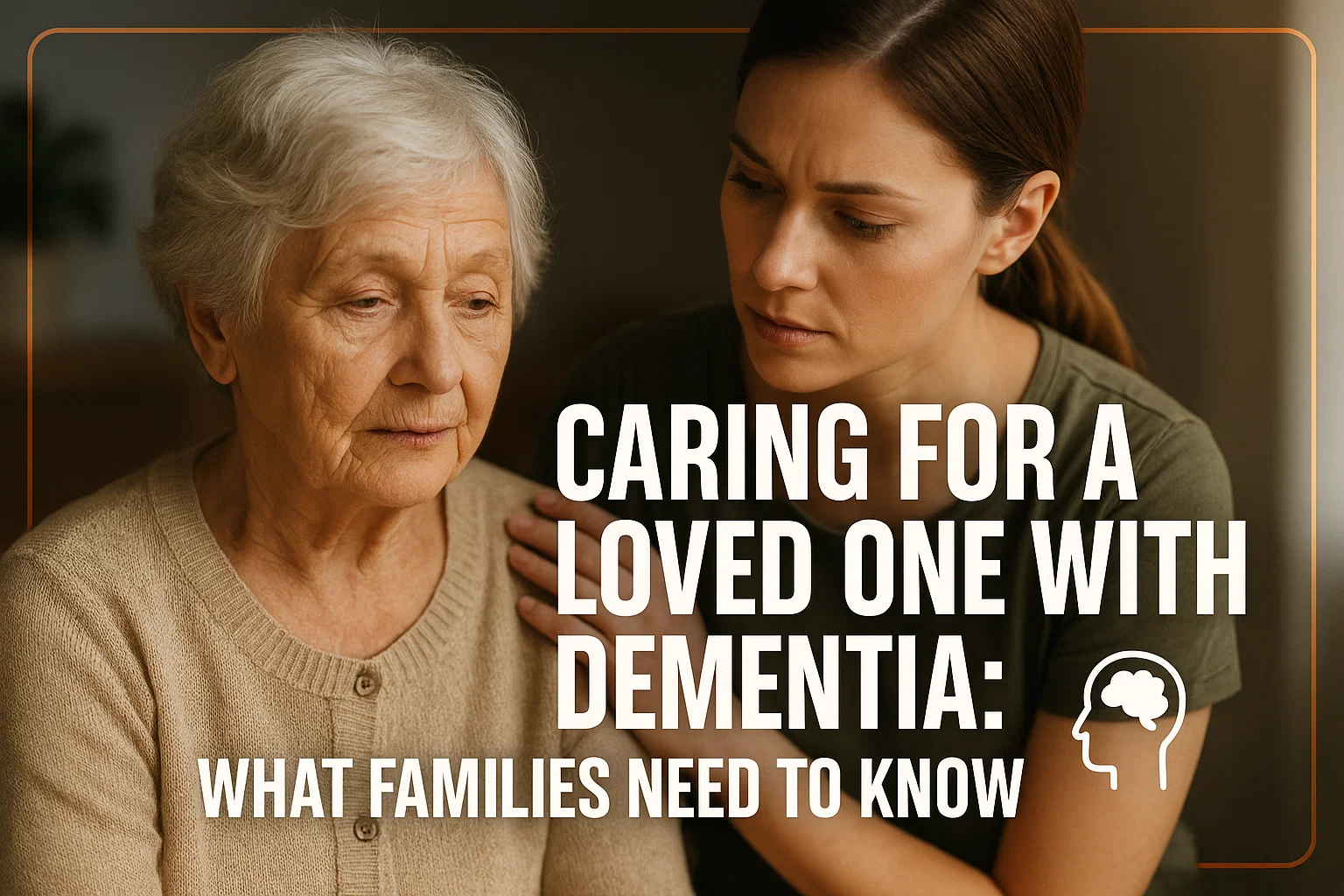Caring for a parent or partner with dementia is one of life’s hardest — and most heartfelt — journeys. It’s not just about managing forgetfulness or keeping a routine; it’s about adapting to a reality that changes day by day. After 20+ years of working closely with families in North Bellmore, NY, I’ve seen the challenges, the love, and the questions that come with this diagnosis.
This guide is for families — the ones trying their best to provide support, comfort, and dignity while holding everything together.
Recognizing When It’s Time for Dementia Care
Common Signs a Loved One Needs Dementia Care
You may first notice the little things: misplaced items, forgotten conversations, or confusion over dates. Over time, these signs become harder to ignore. Some common indicators it’s time to consider outside support include:
- Repeating questions or stories constantly
- Getting lost in familiar places
- Changes in personality or increased agitation
- Neglecting hygiene or meals
- Unsafe behaviors like wandering or leaving the stove on
It’s not about giving up control — it’s about getting help before things reach a crisis point.
Behavioral and Cognitive Red Flags to Watch For
Beyond memory loss, dementia can lead to emotional outbursts, suspicion, paranoia, or even withdrawal. These changes can be just as tough — if not tougher — than the forgetfulness. They’re signs your loved one’s brain is working differently, and it requires specialized, compassionate care.
Caring for Someone with Alzheimer’s at Home

Daily Routines That Support Cognitive Health
Routine brings comfort. Structure the day with:
- A consistent wake-up and bedtime
- Light physical activity
- Simple tasks like folding towels or watering plants
- Listening to familiar music
- Meals at the same times each day
Repetition isn’t boring for someone with dementia — it’s reassuring.
Creating a Safe and Comfortable Home Environment
Safety becomes a top priority as memory fades. Here are a few essentials:
- Remove tripping hazards (rugs, clutter)
- Label doors or rooms clearly
- Install safety locks on kitchen appliances
- Use nightlights in hallways and bathrooms
- Keep emergency numbers visible
At Precious Pearls, we help families make homes dementia-friendly without making them feel like hospitals.
Essential Dementia Care Tips for Family Caregivers
Communication Strategies That Help
Talking with someone who has dementia requires patience, tone, and simplicity. Use short sentences. Maintain eye contact. Avoid arguing, even if they say something untrue. The goal isn’t to correct them — it’s to keep them calm and connected.
Instead of “No, that’s not right,” try,
“I see what you mean. Let’s do this together.”
Managing Stress and Preventing Caregiver Burnout
You can’t pour from an empty cup. Caring for someone with dementia is emotionally and physically draining — especially if you’re doing it alone. If you’re feeling irritable, tired, or hopeless, it’s time to ask for help. Consider:
- Respite care for short breaks
- In-home caregiver assistance
- Joining a dementia caregiver support group
Remember, asking for help isn’t weakness. It’s wisdom.
Understanding the Stages of Dementia and Adapting Your Care
Early-Stage Dementia: Encouraging Independence
In the beginning, your loved one may still function fairly well — they just need gentle reminders and support. Help them:
- Manage medications
- Stay socially active
- Keep a calendar or to-do list
- Continue doing tasks they love (with supervision)
Independence builds confidence — don’t take it away too soon.
Middle-Stage Dementia: Balancing Safety and Engagement
This is when care becomes more demanding. You’ll likely need to assist with:
- Dressing and hygiene
- Mealtime routines
- Preventing wandering
- Keeping them engaged through sensory-friendly activities
It’s a delicate balance between keeping them safe and helping them stay involved in life.
Late-Stage Dementia: Providing Comfort and Dignity
By this stage, communication may be limited. Focus on:
- Gentle touch and presence
- Comforting routines
- Soft music or familiar smells
- Managing physical needs with care and respect
Even when words are lost, love and kindness are always understood.
Exploring the Benefits of In-Home Dementia Support

Personalized Care Plans and Familiar Settings
Dementia patients often feel disoriented in new environments. That’s why in-home care can be so powerful — it brings professional help into their world, not the other way around.
At Precious Pearls, we create dementia-specific care plans based on:
- Stage of memory loss
- Personality and routine
- Emotional triggers
- Family goals and needs
Emotional and Practical Relief for Family Members
Bringing in professional care means:
- You can rest and recharge
- You get to be the daughter/son/spouse again — not just the caregiver
- You have a partner in navigating doctor appointments, care planning, and transition
It’s not about replacing family — it’s about reinforcing it.
How to Choose the Right Dementia Care Provider
What to Look for in a Dementia Care Service
- Experience with Alzheimer’s and dementia
- Ongoing caregiver training in memory care
- Patience, warmth, and cultural sensitivity
- Willingness to customize care
- Good communication with families
Don’t be afraid to ask tough questions — the right provider welcomes it.
Questions to Ask During the Evaluation Process
- How do you match caregivers with clients?
- What dementia-specific training do your caregivers receive?
- How do you handle changes in behavior or mood swings?
- Can we start with part-time hours?
- What’s the process if we need to increase care later?
At Precious Pearls Home Health Care, we walk families through every step — no pressure, just partnership.
Final Thoughts
Dementia care is never easy, but it doesn’t have to be lonely. Whether you’re just starting to notice memory changes or deep into the caregiving journey, know this:
You’re not alone.
Support exists.
And with the right care, your loved one can still live with comfort, dignity, and moments of joy.
Serving families across North Bellmore and Nassau County, we at Precious Pearls are here not just to care — but to care with compassion, experience, and heart.
FAQs
When is the right time to get professional dementia care at home?
There’s no one “perfect” moment — but if your loved one is showing signs like frequent confusion, wandering, difficulty managing daily tasks, or mood changes, it may be time. Families often wait too long, but bringing in support early can reduce stress and keep your loved one safe and more comfortable at home.
Can someone with dementia still live at home safely?
Yes — with the right support. Many people with dementia thrive in familiar surroundings when routines are stable and safety measures are in place. In-home care providers like Precious Pearls specialize in creating dementia-friendly environments while supporting families with personalized care plans.
How do I know if my parent’s forgetfulness is just aging or something more serious?
Everyone forgets things from time to time, but warning signs of dementia go beyond simple memory slips. Repeating stories, confusion in familiar places, personality changes, or trouble managing bills and medications are red flags. If you notice several of these together, it’s a good idea to speak with a doctor.






